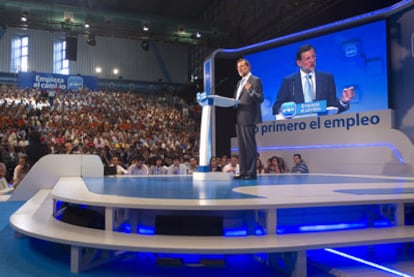'PM in waiting' Mariano Rajoy keeps his cards close to his chest
PP leader closes annual conference with rousing speech that was low on details
Less than two months ahead of a general election that will likely see him emerge as prime minister, opposition leader Mariano Rajoy brought his Popular Party's annual conference to a close on Saturday with a low-key speech that avoided revealing any strategies he may have to tackle Spain's worsening economic crisis.
Addressing a packed hall in Málaga at the conclusion of the three-day event ? which was attended by all Popular Party regional leaders, along with former premier José María Aznar ? Rajoy called on Spaniards to work together to overcome the crisis, but still managed to avoid telling the country just exactly how he intends to battle the EU's highest unemployment rate and get the economy working again.
Opinion polls show Rajoy will win the November 20 election by a wide margin. He has kept his economic policies secret in a similar election strategy to that used by David Cameron in the UK, but analysts say that voters are aware that a vote for Rajoy will mean deep cuts in public spending.
"The plight of the five million Spanish people who want to work and cannot ? and the anguish of the one million households where all members are unemployed ? worries me, as it does everyone," he told delegates.
"Our country is going through a serious social, economic and institutional crisis, which is going to oblige us to make a great effort in the future," he added.
But Spain can and will emerge from the crisis, he insisted.
His speech came as Fitch Ratings slashed Spain's sovereign credit rating by two notches, blaming regional government spending, weak economic growth, and the euro-zone debt crisis. That decision pushed already-expensive borrowing costs even higher.
Rajoy called on his party to overcome the in-fighting that has divided it over the last four years. "If I am here, it is because you wanted it, in spite of everything. You and nobody else.
Rajoy denounced the outgoing Socialist government, in power since 2004, accusing it of leaving "the worst legacy that any government has ever left its successor."
To get the country's finances in order, Rajoy proposed what he called "a coherent economic policy based on austerity and reforms."
"We want to defend social structures, the welfare state, and public services... but with good economic management," he said.
"Administrations should not spend what they do not have," he added.
"I want to govern: through truth, through responsibility, bravely and always seeking harmony," Rajoy told cheering delegates.
The Popular Party has an almost 16-percentage-point lead over the ruling Socialists, according to an opinion poll published on October 2, which would give it an absolute parliamentary majority.
While refusing to outline his strategy, Rajoy lambasted the Socialist Party for its handling of the financial crisis, which has left one in five Spaniards out of work and has paralyzed economic growth for three straight years.
While Rajoy can likely look forward to the freedom of a clear four-year mandate, he is being careful not to spook potential protest voters with talk of widely expected austerity measures.
The Popular Party already controls most of Spain's regional governments, and has announced deep spending cuts that are affecting health and education. Nevertheless, Rajoy said he was committed to education.
"Education is the bridge between a person's origins and the goals they set themselves in life. It is the guarantee of work," he said.
"I want to be the prime minister of all Spaniards. Not just of supporters of the Popular Party. Things are tough, but not impossible. The effort we must make, we must make between us all and we will all share the burden, which will be equal and fair," Rajoy said during his closing speech, adding: "I want to see a Spain in which people are happy, and get up every morning with a job to go to."

Tu suscripción se está usando en otro dispositivo
¿Quieres añadir otro usuario a tu suscripción?
Si continúas leyendo en este dispositivo, no se podrá leer en el otro.
FlechaTu suscripción se está usando en otro dispositivo y solo puedes acceder a EL PAÍS desde un dispositivo a la vez.
Si quieres compartir tu cuenta, cambia tu suscripción a la modalidad Premium, así podrás añadir otro usuario. Cada uno accederá con su propia cuenta de email, lo que os permitirá personalizar vuestra experiencia en EL PAÍS.
¿Tienes una suscripción de empresa? Accede aquí para contratar más cuentas.
En el caso de no saber quién está usando tu cuenta, te recomendamos cambiar tu contraseña aquí.
Si decides continuar compartiendo tu cuenta, este mensaje se mostrará en tu dispositivo y en el de la otra persona que está usando tu cuenta de forma indefinida, afectando a tu experiencia de lectura. Puedes consultar aquí los términos y condiciones de la suscripción digital.








































